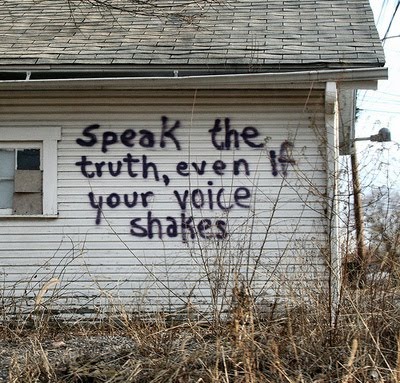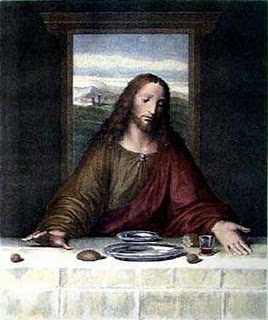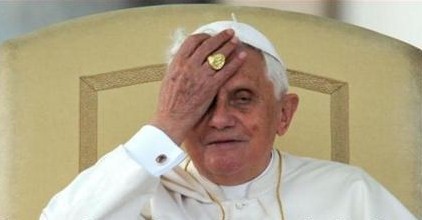For U.S. bishops, economic justice isn’t on the agenda
Catholic leaders, meeting in Baltimore this week, fail to put society’s main problems front and center
 At a time of staggering poverty, rampant unemployment and growing income inequality, Catholic bishops will gather for a national meeting in Baltimore today and remain largely silent about these profound moral issues. A recent Catholic News Service headline about the meeting — “Bishops’ agenda more devoted to internal matters than societal ills” — is a disappointing snapshot for a church that has long been a powerful voice for economic justice.
At a time of staggering poverty, rampant unemployment and growing income inequality, Catholic bishops will gather for a national meeting in Baltimore today and remain largely silent about these profound moral issues. A recent Catholic News Service headline about the meeting — “Bishops’ agenda more devoted to internal matters than societal ills” — is a disappointing snapshot for a church that has long been a powerful voice for economic justice.
The U.S. bishops’ relative silence contrasts with a recent Vatican document that urges stronger regulation of the financial sector and a more just distribution of wealth. Urging reforms to the left of even the most liberal Democrat in Congress, the Vatican spoke in stark terms about a global financial system that is unhinged from moral values. It’s a thoughtful critique of free-market fundamentalism, in keeping with centuries of Catholic teaching as articulated by several popes. A Vatican cardinal even acknowledged that the “basic sentiment” behind the Occupy Wall Street movement aligns with Catholic values on the need for ethical corporate practices and humane financial systems.
Twenty-five years ago this month, Catholic bishops were anything but quiet. They helped drive attention to poor and working families with a landmark pastoral letter, “Economic Justice for All,” that offered a subtle but sober critique of the Reagan administration’s embrace of tax cuts for the rich and draconian cuts to government protections for the poor. The bishops spoke not as policymakers but as moral leaders in touch with the needs of the unemployed and concerned about conservative political leaders’ efforts to strip workers of basic union rights. As a longtime staff member at the U.S. bishops’ conference, I was so proud of the late Cardinal Joseph Bernardin of Chicago and his colleagues, who insisted that a Catholic vision for human dignity did not stop with concern for the unborn but must include a commitment to economic fairness, peace, care for the environment and opposition to the death penalty.
Where are the bishops’ priorities today? In recent years, church leaders have opposed historic health care reform, lashed out at the University of Notre Dame for inviting President Barack Obama to give a commencement address, and publicly chastised pro-choice Catholic politicians even as they give a pass to Catholic lawmakers who push economic policies antithetical to Catholic teaching about the common good. The bishops’ decades of advocacy for comprehensive health care took a detour last year when they opposed the Patient Protection and Affordable Care Act because of concerns it would provide taxpayer funding of abortion — a flawed policy analysis, according to independent experts, some pro-life lawmakers and even the Catholic Health Association.
In recent weeks, the bishops have augmented their campaign against same-sex marriage, appointing a “defense of marriage specialist” to a top position at the U.S. bishops’ conference, and challenged the Obama administration to create a stronger exemption for Catholic organizations that oppose insurance coverage of contraception.
These are important issues, properly addressed by the bishops. However, at a time of economic crisis and growing anti-government ideology embodied by the tea party, Catholic bishops would do well to once again offer a compelling moral response to radical individualism and unbridled capitalism.
Most Americans probably don’t know that Catholic bishops helped lay the groundwork for the New Deal as far back as 1919, when they advocated for a minimum wage and insurance for the elderly, disabled and unemployed. Much of this proud legacy is under threat today from lawmakers, including prominent Catholics like House Speaker John Boehner and Rep. Paul Ryan, who think tax breaks for the wealthiest 1 percent of Americans are more important than funding nutrition programs for low-income women and children.
The U.S. bishops deserve credit for their participation in an interfaith coalition defending government safety-net programs that save lives and provide a measure of dignity to the most vulnerable. Archbishop Timothy Dolan of New York, president of the bishops’ conference, was right to recently urge pastors to address poverty from the pulpit. And the bishops’ national anti-poverty initiative, the Catholic Campaign for Human Development, is a vital resource that helps community-based organizations empower those living on the margins of society. But I fear the church’s revered social justice witness is being crowded out by divisive culture-war battles at a time when Americans need a stronger moral message about the dignity of work and economic justice for all.
A new generation of bishops must find their voice.
Complete Article HERE!
A Key To Understanding Catholic Moral Theology
Don’t miss my five-part series on Catholic Moral Theology.
- Part 1 — A Key To Understanding Catholic Moral Theology
- Part 2 — Sins Of The Flesh
- Part 3 — Sacred Cows
- Part 4 — Seismic Shift
- Part 5 — Make Up Your Mind!
Questions Continue about Who Owns Jesus: Phoenix and Madison Dioceses Take Communion Cup from Laity
Brilliant COMMENTARY from our friends at Bilgrimage. If you’re not reading him every day, you should be.
Back in January, I posted about New York Times columnist Nicholas Kristof’s op-ed piece reflecting on (among other things) the struggle that has gone on recently in the Catholic diocese of Phoenix, in which Bishop Thomas Olmsted excommunicated a nun, Sister Margaret McBride, ministering at St. Joseph’s hospital and then yanked the title “Catholic” from the hospital. Because Sister Margaret and St. Joseph’s had come to a different decision of informed conscience than his own . . . .
My posting notes that Kristof sees this situation, and many others occurring in the Catholic church worldwide these days, as a situation of “tussling over Jesus” in which the fundamental question at stake is, Who owns Jesus? I wrote,
And so, Kristof proposes, Catholics today are tussling over Jesus–over where Jesus is to be found, over what fidelity to Jesus demands in contemporary culture. Over who controls the central symbols of Catholic faith, who defines the meanings of those symbols. Whose word and experience counts, as we read the gospels and apply them to our lives. Who owns Jesus.
And as a posting I made about a month before Kristof’s article appeared also notes, another fundamental (and related) question at the heart of the Olmsted story is, Who owns the sacraments? In that posting, I said,
[T]he recent move of some bishops to deny the Eucharist to Catholics whose political views they judge to be illicit–as if sacraments are candy the father-bishop hands out to good children–raises a profound theological question: who owns the sacraments?
It’s clear the bishops think they do. It’s also abundantly clear from longstanding and rich Catholic tradition that the sacraments “belong” to the entire church, to the people of God. In the name of defending tradition, bishops using the sacraments as a political tool are undermining Catholic tradition.
And now there’s this: as Zoe Ryan reports yesterday in National Catholic Reporter, the Phoenix diocese has just announced plans to begin withholding the eucharistic cup, the communion wine, from Catholics in that diocese, altering the arrangement of communion under both species that had obtained for years following the reforms of Vatican II. Taking back the communion cup, that is to say. There were strong theological reasons, flowing from the reforms of the council, to begin offering communion under both species to the laity, including the renewed understanding of the church as the people of God and the fact that many of the other Christian churches with whom the Catholic church is in ecumenical dialogue practice communion under both species.
It now appears, too, that the diocese of Madison, Wisconsin, is poised to follow the action of Phoenix in this regard.
So, as I read about what’s happening in Phoenix and Madison, the question still remains for me: who owns the sacraments? Who owns Jesus? Do bishops and clergy own the sacraments and Jesus? Or do Jesus and the sacraments belong to the people of God?
And is there so much of Jesus to go around, that a bishop can argue with a straight face that yanking a bit of Jesus away from the faithful is a savvy and compassionate pastoral move? And when they find they can yank the communion cup away from the faithful, as they’ve yanked all communion from Sister Margaret and the title “Catholic” away from St. Joseph’s, what will they take away from the people of God next?
Because there’s an inexorable and wearily predictable logic always at work in the behavior of autocratic systems like that of the Catholic hierarchy (or the Franco regime, or Soviet communism, or the Taliban in Afghanistan): what they find they can take away, they will take away. Since the logic of autocracy absolutely depends on the claim that the autocrat has a right to total control over the central symbols of the social system, over its goods, and yes, over its people.
Remember: though Phoenix diocesan officials are spouting a lot of hot air about the compelling theological reasons for taking the communion cup from the faithful, and though their centrist and right-wing supporters on Catholic blogs are eager to help them spout that hot air, no one at all is asking for these liturgical changes. No one, that is, except a fringe group of the Catholic far-right, to whom Rome and the bishops prefer to listen.
Just asking some questions I’ve long been asking. Ones I intend to keep on asking.
Full Article HERE!
Survey lifts lid on what young people don’t like about church
Nearly three out of every five young Christians disconnect from their churches after the age of 15, but why?
A new research study released by the Barna Group points to six different reasons as to why young people aren’t staying in their pews.
The results of this study come from the interviews of teenagers, young adults, youth pastors, senior pastors and parents that were taken over the course of five years.
First, the study says, churches appear to be overprotective. Nearly one-fourth of the 18- to 29-year-olds interviewed said “Christians demonise everything outside of the church” most of the time. Twenty-two per cent also said the church ignores real-world problems and 18 per cent said that their church was too concerned about the negative impact of movies, music and video games.
Many young adults also feel that their experience of Christianity was shallow. One-third of survey participants felt that “church is boring”. Twenty pe cent of those who attended as a teenager said that God appeared to be missing from their experience of church.
The study also found many young adults do not like the way churches appear to be against science. Over one-third of young adults said that “Christians are too confident they know all the answers” and one-fourth of them said that “Christianity is anti-science”.
Some also feel that churches are too simple or too judgmental when it comes to issues of sexuality. Seventeen per cent of young Christians say they’ve “made mistakes and feel judged in church because of them”. Two out of five young adult Catholics said that the church’s teachings on birth control and sex are “out of date”.
The fifth reason the study gives for such an exodus from churches is many young adults struggle with the exclusivity of Christianity. Twenty-nine per cent of young Christians said “churches are afraid of the beliefs of other faiths” and feel they have to choose between their friends and their faith.
The last reason the study gives for young people leaving the church is they feel it is “unfriendly to those who doubt”. Over one-third of young adults said they feel like they can’t ask life’s most pressing questions in church and 23 per cent said they had “significant intellectual doubts” about their faith.
David Kinnaman, Barna Group president and author of the book on these findings, You Lost Me: Why Young Christians are Leaving Church and Rethinking Church, said part of the problem may be that many churches are geared toward “traditional” young adults.
“But most young adults no longer follow the typical path of leaving home, getting and education, finding a job, getting married and having kids – all before the age of 30,” he said. “These life events are being delayed, reordered, and sometimes pushed completely off the radar among today’s young adults.”
The Barna Update that highlights this study also says that today’s young adults are heavily influenced by the major social, spiritual and technological changes that have occurred in the last quarter century.
Dan Smith, pastor of Momentum Christian Church in Cleveland, Ohio, told The Christian Post in an email that the six points “resonate” with him.
“I feel like part of God’s calling on my life is to reach those 85 per cent (made-up stat) who want to connect with God … but don’t feel like the typical church is helping with that,” he said.
“Most of our church is made up of 20s, 30s, and 40s – younger people – because our leaders have the same mindset as some of the younger people do – we won’t tolerate inauthenicity ‘on stage,’ trite answers, anti-scientific discussion, etc. As Scripture says, we believe that if Jesus is lifted up, young people should also be drawn to him … so we try to lift him up in a way they can participate.”
Instead of overreacting to these statistics (by gearing churches specifically toward young people) or remaining indifferent to them, Kinnaman suggests that churches should cultivate “intergenerational relationships” within their congregations.
“In many churches, this means changing the metaphor from simply passing the baton to the next generation to a more functional, biblical picture of a body – that is, the entire community of faith, across the entire lifespan, working together to fulfil God’s purposes.”
Full Article HERE!


